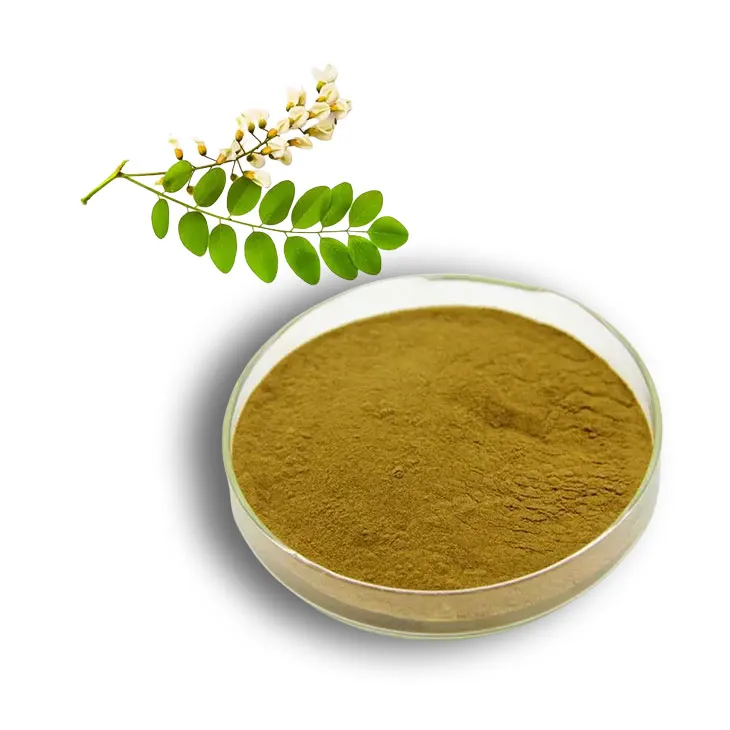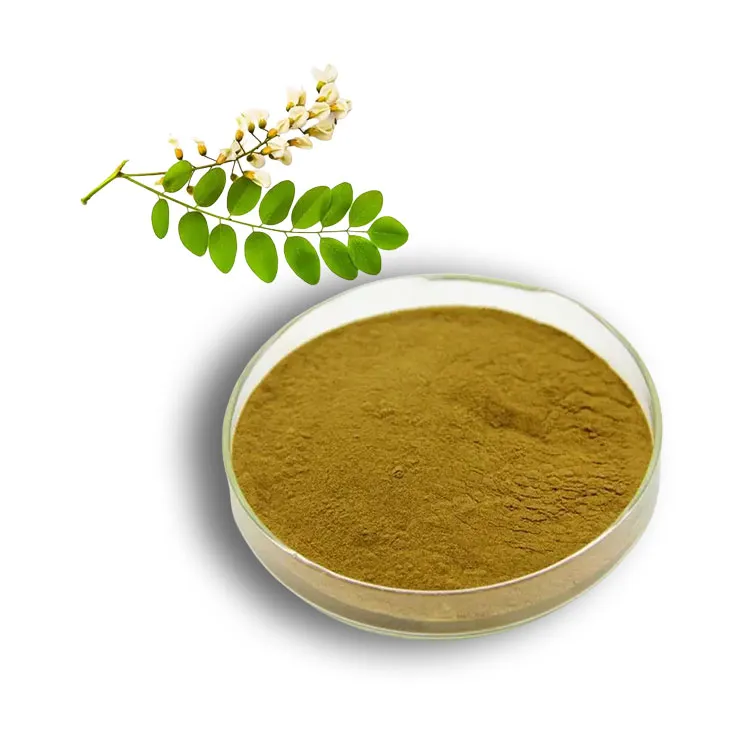- 0086-571-85302990
- sales@greenskybio.com
Five Effects of Sophora japonica Flower Extract + Dosage, Side Effects
2024-11-11

1. Introduction
Hawthorn, scientifically known as Crataegus, is a plant that has been used in traditional medicine for centuries. Hawthorn Extract, derived from different parts of the hawthorn plant such as the berries, leaves, and flowers, contains a variety of bioactive compounds. These compounds are believed to be responsible for the numerous health - promoting effects associated with hawthorn. In this article, we will explore the five main benefits of Hawthorn Extract, as well as its recommended dosage and potential side effects.

2. Five Benefits of Hawthorn Extract
2.1 Heart Health
Cardiovascular support is one of the most well - known benefits of hawthorn extract. It helps to strengthen the heart muscle, which can improve the overall function of the heart. Hawthorn contains flavonoids and procyanidins that have antioxidant properties. These antioxidants can help protect the heart from damage caused by free radicals.
Hawthorn extract may also help to regulate blood pressure. It can dilate blood vessels, reducing peripheral resistance and thus lowering blood pressure in hypertensive individuals. Additionally, it has a positive effect on the heart rate, helping to normalize irregular heartbeats. For people with arrhythmias, hawthorn extract may be a natural alternative to some pharmaceutical medications.
2.2 Cholesterol Management
Another important benefit of hawthorn extract is its role in cholesterol management. It can help to lower LDL (low - density lipoprotein) cholesterol levels, which are often referred to as "bad" cholesterol. By reducing LDL cholesterol, hawthorn extract may contribute to a decreased risk of atherosclerosis, a condition in which plaque builds up in the arteries.
At the same time, it may also have a positive impact on HDL (high - density lipoprotein) cholesterol, or "good" cholesterol. Maintaining a healthy balance between LDL and HDL cholesterol is crucial for cardiovascular health.
2.3 Digestive Health
Hawthorn extract can also be beneficial for digestive health. It has been used traditionally to treat digestive problems such as indigestion, bloating, and stomach cramps. Hawthorn contains compounds that can stimulate the production of digestive enzymes, which helps to break down food more efficiently in the stomach and intestines.
Additionally, it may have a mild laxative effect, promoting regular bowel movements. This can be helpful for people who suffer from constipation or irregular bowel habits.
2.4 Anti - inflammatory Properties
The anti - inflammatory properties of hawthorn extract are also significant. Inflammation is at the root of many chronic diseases, including heart disease, arthritis, and diabetes. Hawthorn contains substances that can reduce inflammation in the body.
For example, its flavonoids can inhibit the production of inflammatory mediators such as cytokines and prostaglandins. This anti - inflammatory effect can help to relieve pain and swelling in conditions like arthritis and may also contribute to overall health by reducing chronic inflammation.
2.5 Stress and Anxiety Relief
Hawthorn extract has been found to have a calming effect on the nervous system, which can be beneficial for stress and anxiety relief. It may work by modulating the levels of neurotransmitters in the brain, such as serotonin and gamma - aminobutyric acid (GABA).
By increasing the levels of these neurotransmitters, hawthorn extract can help to improve mood, reduce feelings of anxiety, and promote relaxation. This makes it a potential natural remedy for people dealing with stress - related disorders or mild anxiety.

3. Dosage of Hawthorn Extract
The appropriate dosage of hawthorn extract can vary depending on several factors, including the form of the extract (e.g., tincture, capsule, or powder), the specific health condition being treated, and the individual's age, weight, and overall health status.
For general cardiovascular health support, a common dosage range is 160 - 900 mg of hawthorn extract per day, typically divided into two or three doses. When using a tincture, the recommended dosage may be around 1 - 2 ml three times a day.
However, it is important to note that these are general guidelines, and it is always best to consult with a healthcare provider before starting any new supplement regimen. They can provide personalized advice based on your specific situation.

4. Side Effects of Hawthorn Extract
Hawthorn extract is generally considered safe for most people when taken in appropriate dosages. However, some potential side effects may occur.
One possible side effect is mild gastrointestinal discomfort, such as nausea, stomach upset, or diarrhea. This is more likely to occur if the dosage is too high or if a person has a sensitive stomach.
In some cases, hawthorn extract may interact with certain medications. For example, it may potentiate the effects of some heart medications, such as beta - blockers and calcium channel blockers. Therefore, if you are taking any prescription medications, it is crucial to inform your doctor before using hawthorn extract to avoid potential drug - supplement interactions.
Additionally, pregnant and breastfeeding women should exercise caution when considering the use of hawthorn extract, as there is limited research on its safety in these populations.
5. Conclusion
Hawthorn extract offers a range of potential health benefits, from promoting heart health to managing cholesterol, improving digestive function, reducing inflammation, and relieving stress and anxiety. However, it is important to use it responsibly, following the recommended dosage guidelines and being aware of potential side effects and interactions. As with any supplement, consulting a healthcare provider is advisable, especially for those with pre - existing health conditions or those taking medications.
FAQ:
What are the five effects of Sophora Japonica Flower Extract?
The five effects of Sophora Japonica Flower Extract may include antioxidant activity, which helps in protecting cells from oxidative damage. It may also have anti - inflammatory properties, potentially reducing inflammation in the body. Another effect could be its role in improving blood circulation. It may contribute to regulating blood sugar levels to some extent. Additionally, it might have antibacterial properties that can help in fighting against certain bacteria.
What is the recommended dosage of Sophora Japonica Flower Extract?
The dosage of Sophora japonica flower extract can vary depending on various factors such as the form of the extract (e.g., capsule, tincture), the intended use, and individual health conditions. However, generally, for adults, a typical dosage in capsule form might be around 500 - 1000 mg per day. But it is always crucial to consult a healthcare professional before starting any supplementation to determine the appropriate dosage.
What are the possible side effects of Sophora japonica flower extract?
Some possible side effects of Sophora japonica flower extract may include gastrointestinal discomfort such as nausea, vomiting, or diarrhea in some individuals. In rare cases, it may also cause allergic reactions, especially in those with pre - existing allergies. Excessive consumption may lead to adverse effects on the liver or kidneys, although this is more likely with very high doses over a long period.
Can Sophora japonica flower extract be used by everyone?
No, Sophora japonica flower extract may not be suitable for everyone. Pregnant or breastfeeding women should avoid it as its safety during pregnancy and lactation has not been fully established. People with liver or kidney diseases should also use it with caution and only under medical supervision. Additionally, those with a known allergy to Sophora japonica should not use the extract.
How does Sophora japonica flower extract improve blood circulation?
It may improve blood circulation by potentially dilating blood vessels. Some of the bioactive compounds in the extract may interact with the smooth muscle cells in the blood vessel walls, causing them to relax. This relaxation leads to an increase in the diameter of the blood vessels, which in turn reduces resistance to blood flow and thus improves circulation.
Related literature
- The Pharmacological Effects of Sophora japonica Extracts: A Review"
- "Sophora japonica Flower Extract: Dosage Considerations in Complementary Medicine"
- "Side - Effects of Herbal Extracts: Focus on Sophora japonica"
- ▶ Hesperidin
- ▶ Citrus Bioflavonoids
- ▶ Plant Extract
- ▶ lycopene
- ▶ Diosmin
- ▶ Grape seed extract
- ▶ Sea buckthorn Juice Powder
- ▶ Fruit Juice Powder
- ▶ Hops Extract
- ▶ Artichoke Extract
- ▶ Mushroom extract
- ▶ Astaxanthin
- ▶ Green Tea Extract
- ▶ Curcumin
- ▶ Horse Chestnut Extract
- ▶ Other Product
- ▶ Boswellia Serrata Extract
- ▶ Resveratrol
- ▶ Marigold Extract
- ▶ Grape Leaf Extract
- ▶ New Product
- ▶ Aminolevulinic acid
- ▶ Cranberry Extract
- ▶ Red Yeast Rice
- ▶ Red Wine Extract
-
Horse Chestnut Extract
2024-11-11
-
Beta Carotene
2024-11-11
-
Cocoa Extract
2024-11-11
-
Agaricus Blazei Extract
2024-11-11
-
Diosmin
2024-11-11
-
Dan Shen Root Extract/Salvia Root Extract
2024-11-11
-
Shikonin
2024-11-11
-
Fig Extract
2024-11-11
-
Stevia Extract
2024-11-11
-
Apricot Powder
2024-11-11





















